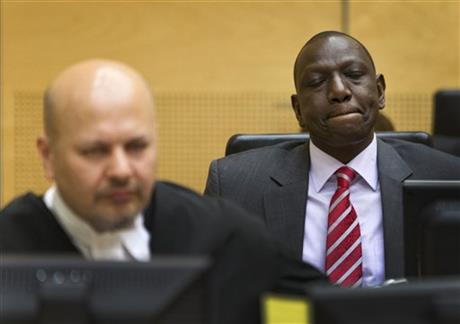
By MIKE CORDER
FILE – A Tuesday, Sept. 10, 2013 photo from files showing Kenya’s Deputy President William Ruto, right, awaiting the start of his trial in the courtroom of the International Criminal Court (ICC) in The Hague, Netherlands, with defense counsel Karim Khan at left. The International Criminal Court’s vexed relationship with Africa took center stage Wednesday, Nov. 20, 2013, on the opening day of the annual summit of its 122 member states. The prosecutions of Kenya’s president and his deputy have plunged relations between the world’s first permanent war crimes court and the African Union to the deepest point in the court’s 12-year history. (AP Photo//Michael Kooren, Pool, File)
THE HAGUE, Netherlands (AP) — The International Criminal Court’s vexed relationship with Africa took center stage Wednesday on the opening day of the annual summit of its 122 member states.
The prosecutions of Kenya’s president and his deputy have plunged relations between the world’s first permanent war crimes court and the African Union to the deepest point in the court’s 12-year history.
Kenyan Deputy President William Ruto is on trial for allegedly fomenting violence in the aftermath of his country’s 2007 elections, and President Uhuru Kenyatta is due to go on trial in February on similar charges. Both men insist they are innocent.
“The court is facing a test of its veracity and its effectiveness,” Kenya’s Foreign Affairs Minister Amina Mohamed told delegates. “This meeting must come up with practical solutions to the challenges facing the court and the entire Rome Statute system.”
The Rome Statute is the court’s founding document, and one of its provisions is that heads of state do not enjoy immunity from prosecution.
But the African Union argues that Ruto and Kenyatta’s trials should be delayed because Kenya needs its leaders to help fight al-Shabab terrorists in neighboring Somalia and at home.
Mohamed hammered home that point in a speech Wednesday.
“Kenya is deeply concerned with the impact the implementation of the Rome Statute poses to its efforts in the promotion of peace, of national healing and reconciliation as well as the rule of law and stability in Kenya and the region that surrounds us,” she said. “The court cannot ignore the social and political realities of the community of nations.”
The Kenya cases are progressing despite efforts by the African Union to halt them. Last week, the U.N. Security Council rejected a resolution calling for the Kenya cases to be deferred by a year.
Delegates agreed Wednesday to hold a special session Thursday proposed by the African Union on the indictment of sitting heads of state and its effect on peace and security, but Tina Intelmann, the president of the court’s 122-nation Assembly of States Parties, said she did not expect the session to produce any changes in the court’s founding principles
Still, she said, states need to talk about the issue in light of the Kenya prosecutions.
“Now in the present circumstances, some countries say, ‘But we have a situation — these people need to govern the country.’ What do you do? We say, ‘Let’s discuss,'” she said.
Rights activists also said the court should not make exceptions for heads of state.
“Giving immunity to sitting leaders would create perverse incentives for them to hold onto power,” said Elizabeth Evenson, senior international justice counsel at Human Rights Watch.
The assembly of the states that are members of the court also was discussing possible amendments to the court’s rules of procedure and evidence that would allow defendants to be present at a trial using video conferencing and let sitting heads of state waive their right to be present at a trial — possibly allowing Kenyatta to stay at home for his.
It was not immediately clear if the proposed changes would be put to a vote.
It was also not clear whether such changes would have a major effect: judges in Ruto’s trial already have allowed him to remain home in Kenya during parts of his trial to conduct state business.
Some African nations also have harshly criticized the court for only indicting Africans. All eight of the cases it is prosecuting are in Africa.
But at the meeting in The Hague, African voices were not universally critical.
Senegal’s Justice Minister Sidiki Kaba said impunity was one of the driving factors behind conflicts in Africa and he said his country has an “enduring and strong commitment to the ICC.”
Intelmann acknowledged the strained relations with Africa, but said the court cannot please everybody all of the time.
“We have to be mindful that it is a criminal court,” she said. “By definition the criminal court is not able to have only friends.”


